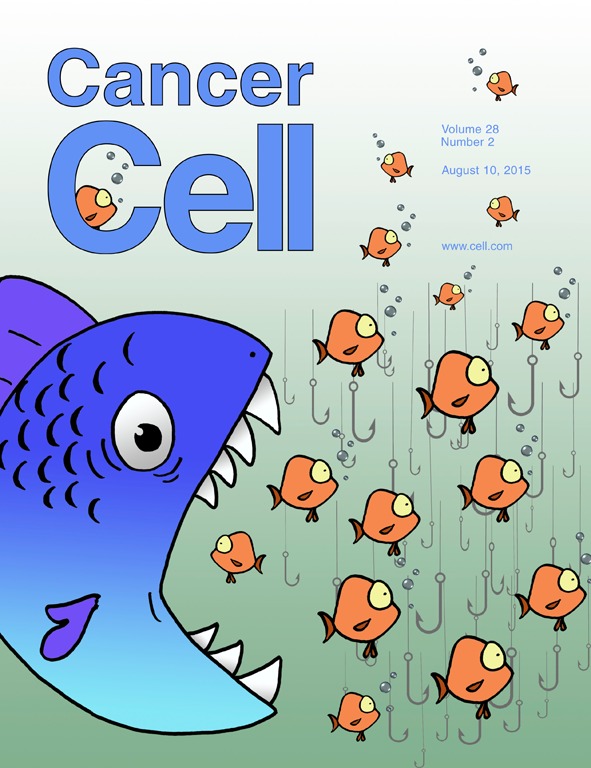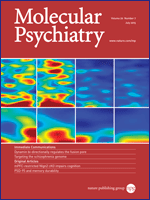17/07/2015
RECENT PUBLICATIONS
Contenido de la página
Small Molecule Inhibition of ERK Dimerization

 Title
Title
Small Molecule Inhibition of ERK Dimerization Prevents Tumorigenesis by RAS-ERK Pathway Oncogenes
Authors
Herrero A, Pinto A, Colón-Bolea P, Casar B, Jones M, Agudo-Ibáñez L, Vidal R,
Tenbaum SP, Nuciforo P, Valdizán EM, Horvath Z, Orfi L, Pineda-Lucena A, Bony E,
Keri G, Rivas G, Pazos A, Gozalbes R, Palmer HG, Hurlstone A, Crespo P.
Publishing data
Cancer Cell. 2015 Aug 10;28(2):170-82.
Abstract
Nearly 50% of human
malignancies exhibit unregulated RAS-ERK signaling; inhibiting it is a
valid strategy for antineoplastic intervention. Upon activation, ERK
dimerize, which is essential for ERK extranuclear, but not for nuclear,
signaling. Here, we describe a small molecule inhibitor for ERK
dimerization that, without affecting ERK phosphorylation, forestalls
tumorigenesis driven by RAS-ERK pathway oncogenes. This compound is
unaffected by resistance mechanisms that hamper classical RAS-ERK
pathway inhibitors. Thus, ERK dimerization inhibitors provide the proof
of principle for two understudied concepts in cancer therapy: (1) the
blockade of sub-localization-specific sub-signals, rather than total
signals, as a means of impeding oncogenic RAS-ERK signaling and (2)
targeting regulatory protein-protein interactions, rather than catalytic
activities, as an approach for producing effective antitumor agents.
Link to PubMed
http://www.ncbi.nlm.nih.gov/pubmed/26267534
Therapeutic antidepressant potential of a conjugated siRNA silencing the serotonin transporter after intranasal administration

Authors
Ferrés-Coy A, Galofré M, Pilar-Cuéllar F, Vidal R, Paz V, Ruiz-Bronchal
E, Campa L, Pazos Á, Caso JR, Leza JC, Alvarado G, Montefeltro A,
Valdizán EM, Artigas F, Bortolozzi A.
Publishing data
Mol Psychiatry. 2015 Jun 23. doi: 10.1038/mp.2015.80. [Epub ahead of print]
Abstract
Major depression brings about a
heavy socio-economic burden worldwide due to its high prevalence and the
low efficacy of antidepressant drugs, mostly inhibiting the serotonin
transporter (SERT). As a result, ~80% of
patients show recurrent or chronic depression, resulting in a poor
quality of life and increased suicide risk. RNA interference (RNAi)
strategies have been preliminarily used to evoke antidepressant-like
responses in experimental animals. However, the main limitation for the
medical use of RNAi is the extreme difficulty to deliver
oligonucleotides to selected neurons/systems in
the mammalian brain. Here we show that the intranasal administration of a
sertraline-conjugated small interfering RNA (C-SERT-siRNA) silenced
SERT expression/function and evoked fast
antidepressant-like responses in mice. After crossing the permeable
olfactory epithelium, the sertraline-conjugated-siRNA was internalized
and transported to serotonin cell bodies by deep Rab-7-associated
endomembrane vesicles. Seven-day C-SERT-siRNA evoked similar or more
marked responses than 28-day fluoxetine treatment. Hence, C-SERT-siRNA
(i) downregulated 5-HT1A-autoreceptors and facilitated
forebrain serotonin neurotransmission, (ii) accelerated the
proliferation of neuronal precursors and (iii) increased hippocampal
complexity and plasticity. Further, short-term C-SERT-siRNA reversed
depressive-like behaviors in corticosterone-treated mice. The present
results show the feasibility of evoking antidepressant-like responses by
selectively targeting neuronal populations with appropriate siRNA
strategies, opening a way for further translational studies.
Link to PubMed
http://www.ncbi.nlm.nih.gov/pubmed/26100539
more publications
IBBTEC
Comunicación y Divulgación científica
Instituto de Biomedicina y Biotecnologia de Cantabria.
PCTCAN
Cl. Albert Einstein, 22
39011 Santander